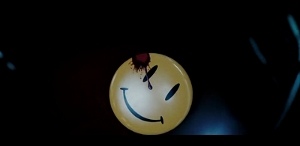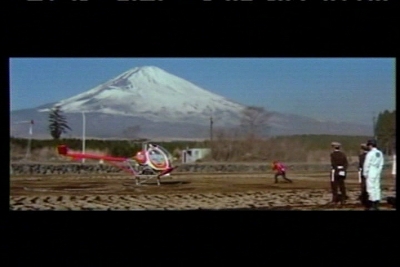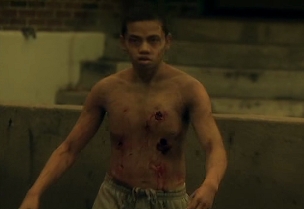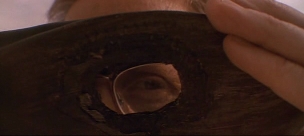 After an obviously tacked-on bit of pre-credit narration, explaining the movie’s plot, D-War launches us onto the most audaciously stupid journey I’ve seen in a long time, beginning with the most audaciously stupid directorial decision of (most likely) all time: a triple flashback…explaining the movie’s plot. Again.
After an obviously tacked-on bit of pre-credit narration, explaining the movie’s plot, D-War launches us onto the most audaciously stupid journey I’ve seen in a long time, beginning with the most audaciously stupid directorial decision of (most likely) all time: a triple flashback…explaining the movie’s plot. Again.
Ordinarily, I’d assume a poor test-screening panicked D-War‘s producers into this last minute front-loading, a glut of action scene-driven exposition hot off the Lord of the Rings press. But the vagaries of D-War offer a much simpler, and much dumber, explanation for this film’s hit-the-audience-in-the-face-with-bricks approach. Someone, somewhere, must’ve honestly thought that starting off with a triple flashback worked. Somehow, it made the film better. Marvel with me, for a moment, at such rampant idiocy, and never again ask yourself why movies often suck. {More}

 As if anyone doesn’t already know, Watchmen is an award-winning, twelve-issue comic book created by the writer/magician Alan Moore and the artist Dave Gibbons, originally published by DC Comics in that dark and distant year of your lord, 1986. Steeped in Reagan-era pessimism and dreams of nuclear holocaust, the book did more for superhero storytelling than all Frank Miller’s work combined. It dragged the genre, kicking and screaming, into the late twentieth century, disguising its social relevance with a baroque self-reflexiveness now recognized as the hallmark of comic’s Iron Age.
As if anyone doesn’t already know, Watchmen is an award-winning, twelve-issue comic book created by the writer/magician Alan Moore and the artist Dave Gibbons, originally published by DC Comics in that dark and distant year of your lord, 1986. Steeped in Reagan-era pessimism and dreams of nuclear holocaust, the book did more for superhero storytelling than all Frank Miller’s work combined. It dragged the genre, kicking and screaming, into the late twentieth century, disguising its social relevance with a baroque self-reflexiveness now recognized as the hallmark of comic’s Iron Age.
 In the far flung future of…for all intents and purposes, 1967…the Fuji Astronautical Flight Center, Japan’s answer to Cape Canaveral, prepares a sixth manned mission to Mars. The previous five met mysterious ends at the hands of equally-mysterious UFOs supposedly camped out in interplanetary space. “Your job,” a FAFC flunky tells the doomed sixth crew of gullible space monkeys, “is to determine what’s stopping us from reaching Mars.”
In the far flung future of…for all intents and purposes, 1967…the Fuji Astronautical Flight Center, Japan’s answer to Cape Canaveral, prepares a sixth manned mission to Mars. The previous five met mysterious ends at the hands of equally-mysterious UFOs supposedly camped out in interplanetary space. “Your job,” a FAFC flunky tells the doomed sixth crew of gullible space monkeys, “is to determine what’s stopping us from reaching Mars.” I knew this would happen, if for no other reason than that this is the eleventh motion picture in the Star Trek franchise/canon.
I knew this would happen, if for no other reason than that this is the eleventh motion picture in the Star Trek franchise/canon. I don’t know whether Diary of the Dead was an honestly-bungled attempt to move the zombie movie forward as a format…or a flagrantly half-assed attempt to make up for Land of the Dead. I can’t see George Romaro’s heart. Anything is possible. Making a decent zombie flick only seems an impossible task thanks to my relative inexperience. Dawn of the Dead was the last great hope and that was 1978. The wave crested, and it’s been rolling back ever since we left that mall. Why can no one admit that mall was the last good idea George Romaro had? Why must we have Diary of the Dead?
I don’t know whether Diary of the Dead was an honestly-bungled attempt to move the zombie movie forward as a format…or a flagrantly half-assed attempt to make up for Land of the Dead. I can’t see George Romaro’s heart. Anything is possible. Making a decent zombie flick only seems an impossible task thanks to my relative inexperience. Dawn of the Dead was the last great hope and that was 1978. The wave crested, and it’s been rolling back ever since we left that mall. Why can no one admit that mall was the last good idea George Romaro had? Why must we have Diary of the Dead? I first reviewed Falling Down on May 6th, 2000, triumphantly trumpeted as “our 150th review!” As if that were some kind of achievement. That review is still available in all its poverty and horror. It, like so many of my early reviews, deserves to be replaced, or quietly buried. (So why link to it, right? For the Internet’s sake, friend. For the Internet’s sake.)
I first reviewed Falling Down on May 6th, 2000, triumphantly trumpeted as “our 150th review!” As if that were some kind of achievement. That review is still available in all its poverty and horror. It, like so many of my early reviews, deserves to be replaced, or quietly buried. (So why link to it, right? For the Internet’s sake, friend. For the Internet’s sake.) Most commentators believe the title refers to that elephant in the room no one wants to talk about. Director Gus Van Sant claims that it refers to that poor pachyderm from the Chinese proverb, the one getting groped by five blind men, each of whom believes he has something different under his hand. The very subjectivity of that ambiguous, titular word epitomizes Elephant‘s problems with subjectivity as a whole. By attempting to present a subjective view of one (fictional) American high school shooting Van Sant, quite unawares, paints himself into corner. So with us all.
Most commentators believe the title refers to that elephant in the room no one wants to talk about. Director Gus Van Sant claims that it refers to that poor pachyderm from the Chinese proverb, the one getting groped by five blind men, each of whom believes he has something different under his hand. The very subjectivity of that ambiguous, titular word epitomizes Elephant‘s problems with subjectivity as a whole. By attempting to present a subjective view of one (fictional) American high school shooting Van Sant, quite unawares, paints himself into corner. So with us all. Conceived in the wake of Columbine and completed in 2001, Zero Day sat on a shelf for two years before it saw the light of day. Something happened in the fall of 2001, on some date I can never quite remember, despite the gnawing sensation that we, as a nation, swore never to forget. In any case, The Event (whatever it was) panicked Zero Day‘s distributors into canceling the film’s release. Undeterred, writer/director Ben Coccio used the time to do what all serious creative people do with their stalled projects: tinker. The result gained a limited release in 2003. The fact that I only heard about this film last week should tell you just how “limited.” I like to believe that, even in the midst of 2003’s War Fever, I would’ve noticed a “school shooter” movie opening up down the street. Yet, in the course of researching my next novel (goddamn that feels good to type) I’ve discovered three from that year alone. (Thanks, Variety–you industry rag, you). So here we are, with the first.
Conceived in the wake of Columbine and completed in 2001, Zero Day sat on a shelf for two years before it saw the light of day. Something happened in the fall of 2001, on some date I can never quite remember, despite the gnawing sensation that we, as a nation, swore never to forget. In any case, The Event (whatever it was) panicked Zero Day‘s distributors into canceling the film’s release. Undeterred, writer/director Ben Coccio used the time to do what all serious creative people do with their stalled projects: tinker. The result gained a limited release in 2003. The fact that I only heard about this film last week should tell you just how “limited.” I like to believe that, even in the midst of 2003’s War Fever, I would’ve noticed a “school shooter” movie opening up down the street. Yet, in the course of researching my next novel (goddamn that feels good to type) I’ve discovered three from that year alone. (Thanks, Variety–you industry rag, you). So here we are, with the first.